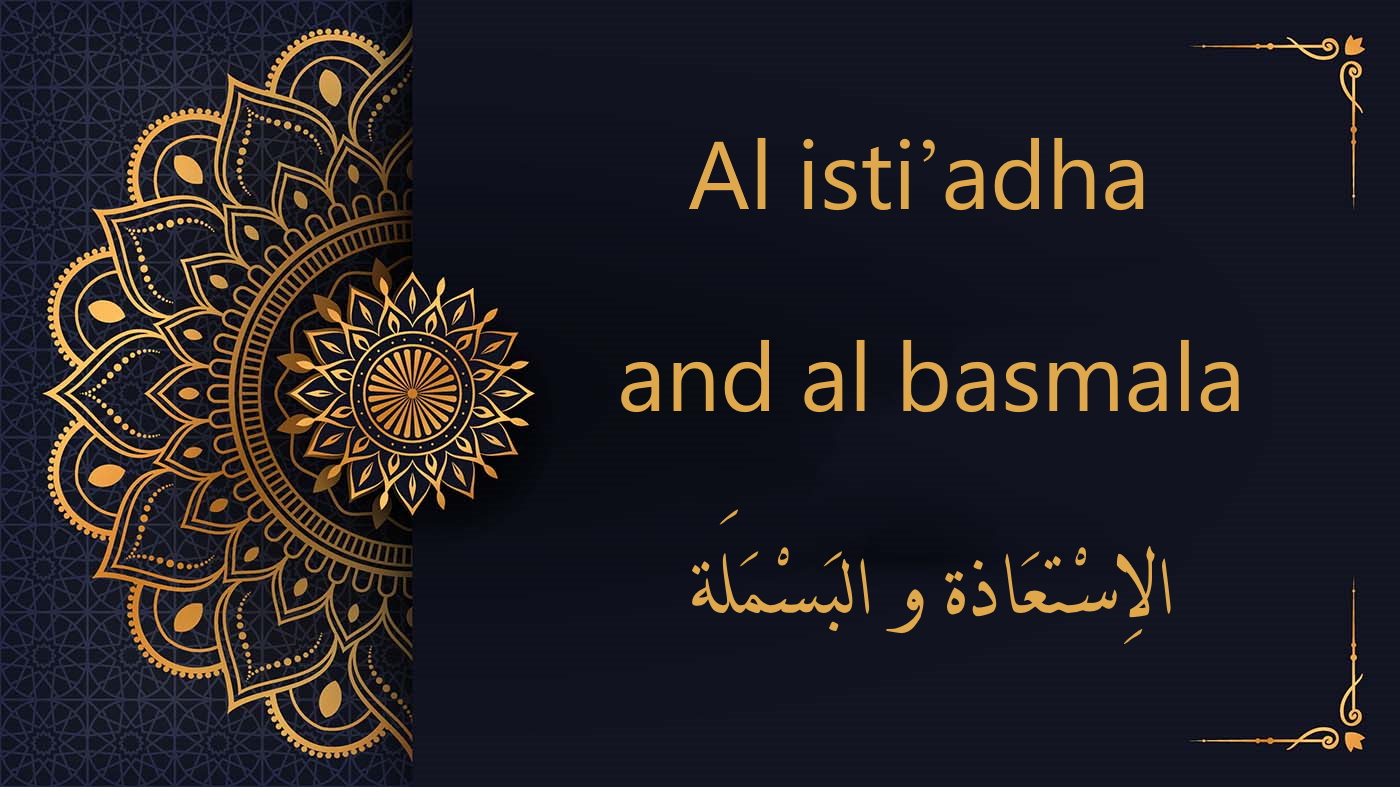
Allah instructs us that before we embark on reciting His Sacred Book, we should seek His refuge against the accursed Satan, ensuring that we are under His divine guidance and protection. As expressed in His esteemed Book:
فَإِذَا قَرَأْتَ الْقُرْآنَ فَاسْتَعِذْ بِاللَّـهِ مِنَ الشَّيْطَانِ الرَّجِيمِ
So when you recite the Qur’an, [first] seek refuge in Allah from Satan, the expelled [from His mercy]. (16-98)
This verse emphasizes the significance of seeking Allah’s refuge when delving into the recitation of the Holy Qur’an. To invoke this protection from the accursed Satan, one uses the following formula:
أَعُوذُ بِاللَّـهِ مِنَ الشَّيْطَانِ الرَّجِيمِ
“I seek refuge with Allah against satan the accursed”
Scholars universally agree upon the importance of this formulation when one initiates the recitation of the Qur’an. Most experts in the field of qiraa deem it as ‘mustahabb’ (recommended). However, a few scholars regard it as obligatory. One can choose to pause after reciting al isti’adha or continue seamlessly into the next part, be it the basmala or another verse from the Holy Qur’an. Both methods are valid and authentic, but it is preferable to connect al isti’adha with the subsequent verse.
Based on the context, al isti’adha may be recited either audibly or in a subdued tone. Reciting al isti’adha audibly is recommended in two scenarios:
Don’t want to go through the translation anymore?
30 free minutes with your qualified Egyptian teacher.
Reciting al isti’adha quietly is practiced in the following situations:
Additional Pointers:
For instance: Considering Sura Al-Baqara verse 255 (ayat al-kursiy), it begins with:
اللَّـهُ لَا إِلَـٰهَ إِلَّا هُوَ الْحَيُّ الْقَيُّومُ
Directly connecting the word الرَّحِيْمِ with the name of Allah اللَّـهُ can lead to a misinterpretation. Therefore, Imam Ash-Shâtibi advised reciting al-basmala following al-‘isti’adha to ensure clarity and proper understanding.
Seamless Integration: Linking al-‘isti’adha, basmala, and the start of a surah without interruption. This approach is considered valid. For instance, using Surah Al Ikhlas verse 1:
We pause briefly after reciting al isti’adha and then after the basmala, before commencing with the sura. This method is the most prevalent.
Example:
ou seamlessly connect al isti’adha with the basmala, pause momentarily, and then initiate the sura’s recitation.
Example:

We recite Al ‘Isti’adha and pause, then continue by joining the Basmala with the starting verse of the Surah.
Example:

The Basmala refers to the utterance of:
بِسْمِ اللَّـهِ الرَّحْمَـٰنِ الرَّحِيمِ
In the name of Allah, the Entirely Merciful, the Especially Merciful.
It is unanimously agreed upon that it constitutes a verse in Surah An-Naml, specifically verse 30:
إِنَّهُ مِن سُلَيْمَانَ وَإِنَّهُ بِسْمِ اللَّـهِ الرَّحْمَـٰنِ الرَّحِيمِ
Indeed, it is from Solomon, and indeed, it reads: ‘In the name of Allah, the Entirely Merciful, the Especially Merciful, (27:30)
The status of the basmala at the start of each sura sparks varied opinions among scholars and Qur’an reciters. The Kufa and Mecca readers, along with Imam Ach-Châfi’i, perceive it as a distinct verse for every sura.
In contrast, the reciters from Medina, Basra, and Sham, supported by Imam Malik, see it not as a stand-alone verse but as a separator between suras, serving as a blessing at each sura’s commencement.
Imam Hafs recognizes the basmala of each sura as a distinct verse. Several reciters, including Ibn Kathir, Asim, Al-Kasahi, Abu Jafar, Qalun, and Warsh (via the Asbahany route), intone the basmala between two suras, with the exception of the transition between suras Al-Anfal and At-Tawbah.
On the other hand, Hamza transitions between two suras without uttering the basmala. Khalaf is known to have practiced this as well, although it’s noted that at times, he made a subtle pause—reading the final verse of one sura and the initial verse of the next without a basmala and without breaking his breath.
Other reciters, namely Abu Amru, Ibn Amr, Yaqub, and Warsh (following the Al-Azraq route), demonstrated three approaches:
Notably, all reciters unanimously agree that there’s no basmala between sura barâa, also known as At-Tawbah, and its preceding sura.
Consecutively Reading the End of One Sura to the Beginning of the Next via the Basmala Without Pause.”
Example from Sura Al Falaq (verse 5) to Sura An Nas (verse 1):
Pausing After Both Al Isti’adha and the Basmala Before Commencing the Sura.
Example illustrating this common practice:
Concluding One Sura and Seamlessly Transitioning to the Next with Basmala.
Example:
It is not permissible to connect the final verse of a sura with the basmala and then pause before commencing the first verse of the subsequent sura. This is because the basmala signifies the commencement of a sura, not its conclusion.
Example:
Key Points:
Our lesson on tajweed rules has come to a conclusion. Insha’Allah, our next session will delve into the ghunna of the letters Noon and Meem.
At Al-dirassa Institute, we provide a streamlined approach to mastering tajweed rules with the guidance of proficient instructors. If you’re keen on furthering your knowledge, please reach out to us.
Discover the experiences of our delighted clients who have thoroughly enjoyed utilizing this standout feature.
Alhamdulillah I‘m very pleased with the arabic and Qur’an lessons I receive from teacher Umm Tasneem and I‘m also content with the al-dirassa administration team who were very quick in answering any questions I had. In a month I progressed a lot and I cannot wait to continue my studies with al-dirassa. May Allah reward everyone at al-dirassa.
Verified review - view original
My Qur’an teacher is fantastic, she teaches me in a loving and kind way where I look forward to the lessons and learn so much. My Arabic teacher is equally as nice and has a lot of patience with me, she has great expertise in the field and I’ve progressed really quickly with her. Thank you Al-dirassa!
Verified review - view original

Al-dirassa Institute offers you a gift to help you begin your journey to being fluent in Arabic and learning the Quran.

Al-dirassa Institute offers you a gift to help you begin your journey to being fluent in Arabic and learning the Quran.